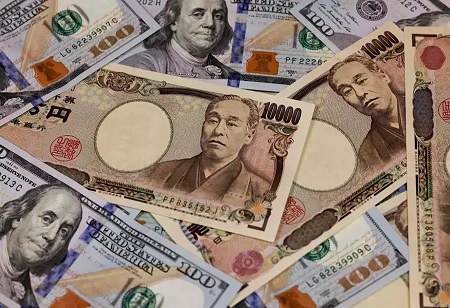
Yen Retreats Against Dollar After Suspected Market Intervention Surge

 In the early trading session, the yen experienced a reversal, conceding ground after a sudden overnight surge against the dollar. Traders and analysts promptly linked this movement to intervention by Japanese authorities. The dollar strengthened by 0.9%, reaching 155.98 yen as of 0100 GMT. This retracement roughly equated to half of its rapid climb on Wednesday evening, when it surged from approximately 157.55 to precisely 153 within a span of about 30 minutes.
In the early trading session, the yen experienced a reversal, conceding ground after a sudden overnight surge against the dollar. Traders and analysts promptly linked this movement to intervention by Japanese authorities. The dollar strengthened by 0.9%, reaching 155.98 yen as of 0100 GMT. This retracement roughly equated to half of its rapid climb on Wednesday evening, when it surged from approximately 157.55 to precisely 153 within a span of about 30 minutes.
The significant overnight movement occurred during a tranquil market period following the closure of Wall Street and hours after the Federal Reserve concluded its policy meeting. During the meeting, Chair Jerome Powell reiterated that persistent inflation could delay any potential interest rate cuts for some time.
"It caught markets off guard because, obviously, it happened in the U.S. session and seemed to be timed with the FOMC to take advantage of a weaker dollar", said Kyle Rodda, senior financial market analyst at Capital.com in Melbourne. "The 'sneak attack' element really is the MOF (Japan's Ministry of Finance) looking to punish speculators and send a warning about shorting the yen".
The dollar has sustained a more than 10% increase against the yen this year as traders adjusted their outlooks regarding the timing of the initial Fed rate cut. Meanwhile, the Bank of Japan has indicated a cautious approach toward further policy tightening following its first rate hike since 2007 in March.
The disparity between long-term government bond yields in the two nations stands at a substantial 376 basis points. This differential played a role in driving the dollar to reach a 34-year high of 160.245 yen and triggered a notable reversal, attributed in official data to Japanese intervention amounting to approximately $35 billion. The dollar index, gauging the currency against the yen, euro, and four other key counterparts, edged up by 0.07% to 105.78. This followed a 0.56% pullback on Wednesday from levels near six-month peaks.
The euro remained relatively unchanged at $1.071025, maintaining its position after a 0.45% increase in the preceding session. Similarly, sterling held steady at $1.2530, mirroring its performance following a 0.28% climb the day before. Prior to the yen's sudden surge, the dollar had already shown signs of weakness. This occurred as Fed Chair Powell reiterated the central bank's inclination towards easing policy, albeit with a delay in timing, and provided no indication of considering further rate hikes.

